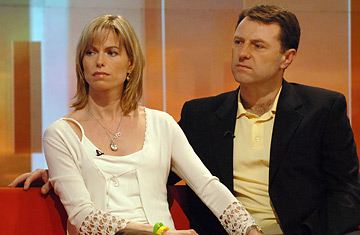
Kate and Gerry McCann talk on BBC Breakfast, May 1, 2008 in London, England.
Few stories in recent years have dominated the British news and gripped the public as much as the plight of missing British toddler Madeleine McCann. And with Saturday marking the first anniversary of the 4-year-old's disappearance from her family's vacation apartment in the Portuguese resort town of Praia da Luz, the ongoing media circus is again revving into overdrive. "There will be wall-to-wall coverage," says Roy Greenslade, a British media critic.
Indeed, it has already begun. A two-hour television documentary about the girl's parents, Gerry and Kate McCann, was broadcast nationally last Wednesday night. It accorded sympathetic treatment to the McCanns, who remain official suspects in the investigation. The couple were portrayed as clearly anguished victims, and they were given a chance to renew their appeal for information to help find Madeleine, whom they believe is still alive. Greenslade expects most of the anniversary coverage will likewise hew to a "respectful" line toward the couple.
That attitude has not always been in evidence over these last 12 months. The McCann story has been fueled by accusations, rumors, leaks — many of them aimed at the McCanns — and plot twists that would strain credulity even in a work of fiction.
Like most nightmares, it began innocently enough: Madeleine and her younger twin siblings were left asleep in the apartment while their parents dined with friends at a nearby restaurant. When Kate McCann went to check on them, Madeleine was gone. The story quickly hit the front pages in Britain and much of Europe, and remained a top story all summer. The McCanns — both physicians — proved adept at putting together a well-publicized global campaign to help find Madeleine. They enlisted the help of pop and sports stars, and even had an audience with Pope Benedict XVI.
But the story shot into the media stratosphere last September, when the Portuguese police named the McCanns "arguidos," or suspects, making the couple the focus of the continuing Portuguese investigation — which at that point was clearly foundering. What followed was a constant flow of often outlandish and anonymous leaks that seem designed to bolster the case against the parents. One claimed the girl was buried at sea; another said the McCanns had participated in wife-swapping orgies. The leaks typically first appeared in Portuguese news outlets before being repeated by the British media. The McCanns countered by successfully suing the Express Newspaper group for libel, winning a $1 million settlement and front-page apologies in March.
Despite the leaks, British media coverage of the McCanns has been largely sympathetic. Nevertheless, as Greenslade notes, much of the British public has developed a skeptical view of the couple. The McCanns' understandable effort to keep their daughter's fate in the headlines inadvertently turned them into celebrities, he says. "The result is two negatives: they're seen as by some as bad parents, and they're famous for being bad parents. So, there's been a license to trash them. And it's cruel." In the documentary, the couple reveal the type of hate mail they've received. One writer called them "scum" and said their "drunken arrogance" was to blame for their missing "brat."
Clearly the McCanns saw the inevitable renewed interest the anniversary would bring as a chance to not only make new pleas for information, but to perhaps rehabilitate their shaky image. Hence, the access they gave the documentary filmmaker for ITV, a major British channel, and a subsequent inteview they gave to the BBC. Moreover, the McCanns now say they may write a book to tell their side of things. "We receive dozens of requests for book deals and may consider them in the future," says Sonia Beldom, a spokesperson for the couple. News reports say a book contract could be worth $2 million. Certainly other books are in the offing, both in Britain and Portugal, including The Truth of the Lie, by Goncalo Amaral, the police officer who led the investigation until he was fired for criticizing British police.
However, the McCanns' ability to speak — or write — about the investigation is limited while they remain official suspects. Mark Williams-Thomas is a former detective who's now a regular consultant to various media outlets. He says police working the case in Praia da Luz "are in no rush to lift the arguido status." Recently, Portuguese police reportedly suggested that the McCanns return to Portugal to film a reenactment of the fateful night. But Williams-Thomas says the likelihood of that happening "is very slim," mainly because the McCanns distrust the police now. "Relations between the McCanns and the police have broken down completely." The couple confirmed to the BBC that they now have no direct contact with the investigators.
Williams-Thomas is critical of how the police handled the disappearance. "It went wrong right from the start, when they did not treat it as a critical incident," he says. The McCanns should have immediately been considered suspects, if only to quickly exonerate them, he says, and the crime scene should have been properly preserved — neither of which happened. Because of initial mistakes, Williams-Thomas says, it's doubtful the crime will ever be solved, unless Madeleine's body is discovered. He also doubts the police have evidence to charge the McCanns with murder. But, he says, it is likely they will be charged with child neglect, an accusation the McCanns reject.
No matter how efforts to solve the crime end, Greenslade says, Kate and Gerry McCann will never escape their unwanted, toxic celebrity. "They are media fodder for life. Every event in their life will be a reason for media intrusion," he says. "This will not be a forgotten case." That will remain true even in the increasingly unlikely event that Madeleine's fate is finally discovered.
